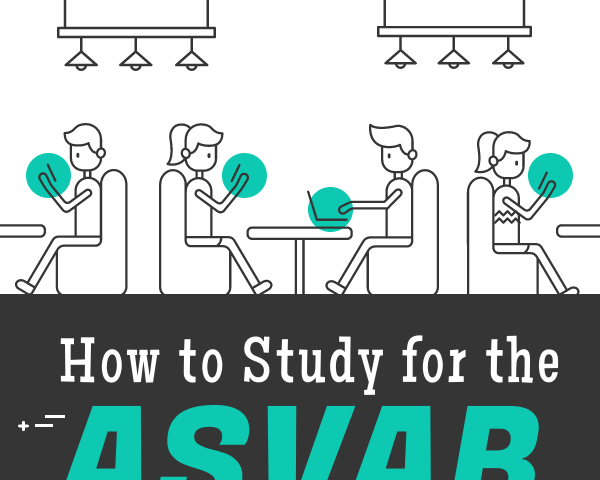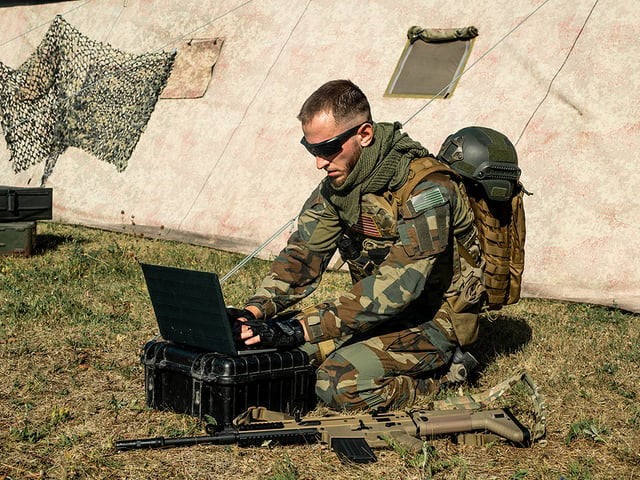
How to Study for the ASVAB
The Armed Services Vocational Aptitude Battery (ASVAB) is a critical examination for those aspiring to join the military. With scores that could determine your military occupation, it’s essential to be adequately prepared. If you’re wondering how best to tackle this examination, you’re in the right place!
What’s on the ASVAB?
The ASVAB exam contains nine sections, each meticulously designed to gauge distinct skills and knowledge areas of potential military recruits. These sections encompass a spectrum of topics, from the realms of science and math to mechanical understanding and spatial reasoning. Serving as a comprehensive assessment, the ASVAB ensures that candidates possess the foundational knowledge requisite for various military positions. As we proceed, we will unpack the specifics of each section, shedding light on their significance and what they entail.
General Science (GS)
This section delves into foundational science concepts every candidate should be familiar with. Here’s what’s covered:
-
Biology: Fundamental concepts about cell structures, genetics, and human anatomy.
-
Chemistry: Basics about elements, compounds, chemical reactions, and periodic table essentials.
-
Physics: Basic principles related to motion, energy, and force.
-
Earth Science: Introduction to meteorology, geology, and general environmental science.
Arithmetic Reasoning (AR)
Focused on arithmetic and logical reasoning, this section evaluates:
-
Basic Math Operations: Addition, subtraction, multiplication, and division.
-
Word Problems: Using math to solve real-world problems and scenarios.
-
Percentage, Ratios, and Proportions: Essential for understanding and interpreting data.
Word Knowledge (WK)
Aimed at measuring the candidate’s grasp over the English language, this section assesses:
-
Vocabulary: Recognizing synonyms, antonyms, and the ability to deduce meanings from context.
-
Word Usage: Understanding the appropriate usage of words in sentences.
Paragraph Comprehension (PC)
This section assesses the candidate’s ability to extract information and deduce meaning from written passages.
-
Main Idea: Identifying the primary point of the paragraph.
-
Supporting Details: Recognizing facts or details that back the main idea.
-
Inference: Drawing conclusions based on the information provided.
Mathematics Knowledge (MK)
Tackling more complex math topics, candidates will face:
-
Algebra: Basic equations, functions, and operations.
-
Geometry: Understanding shapes, properties, and theorems.
Electronics Information (EI)
For those keen on roles related to electronics, this section dives into:
-
Circuit Principles: Understanding current, resistance, voltage, and power.
-
Electronic Devices: Basic knowledge about transistors, capacitors, and inductors.
-
Circuit Diagrams: Recognizing and interpreting basic electronic circuit symbols.
Auto & Shop Information (AS)
This is pivotal for candidates interested in mechanical roles.
-
Automotive: Basics of vehicle maintenance, troubleshooting, and repair concepts.
-
Shop: Recognizing and understanding wood and metal shop tools, procedures, and safety protocols.
Mechanical Comprehension (MC)
Evaluating mechanical aptitude, this section covers:
-
Mechanical Principles: Understanding levers, pulleys, gears, and the laws of motion.
-
Tools and Machines: Recognizing and understanding the operation of basic mechanical tools and machines.
Assembling Objects (AO)
This is all about spatial awareness and reasoning:
-
Object Visualization: Ability to understand how an object will look when its parts are assembled.
-
Pattern Recognition: Determining how shapes and objects fit together in space.
Important Sections to Focus On
The ASVAB is a comprehensive exam, but when it comes to determining eligibility for enlistment, particular emphasis is placed on specific sections, collectively known as the Armed Forces Qualification Test (AFQT) score. Comprising the AR, MK, WK, and PC sections, the AFQT score doesn’t just offer insight into a candidate’s abilities; it’s the linchpin that determines military enlistment eligibility. As such, it stands out as the most critical component of the ASVAB. Here’s what you’ll need to know:
1. Arithmetic Reasoning (AR)
The Arithmetic Reasoning (AR) section delves into your mathematical problem-solving skills, centering on real-life situations where arithmetic comes into play. This segment evaluates the efficiency with which you can tackle problems using fundamental arithmetic operations, emphasizing basic operations like addition, subtraction, multiplication, and division. Moreover, it involves multi-step word problems and concepts related to percentages, ratios, and proportions.
2. Mathematics Knowledge (MK)
In the Mathematics Knowledge (MK) section, the focus shifts to more intricate mathematical theories and applications than what’s covered in AR. Here, your proficiency in high school math, encompassing subjects like algebra and geometry, is examined. The main areas of concentration include algebraic equations and inequalities, geometrical properties, theorems, postulates, and introductory trigonometry.
3. Word Knowledge (WK)
Word Knowledge (WK) assesses your proficiency with vocabulary, synonyms, and antonyms. It serves as a reflection of your grasp on word semantics, usage in context, and associations. Key aspects to hone in on for this section are common ASVAB vocabulary, discerning the context of varied word applications, and pinpointing words that share similarities in meaning.
4. Paragraph Comprehension (PC)
The Paragraph Comprehension (PC) section is tailored to measure your capabilities in comprehending and interpreting textual content. The spotlight is on your reading comprehension and critical analytical abilities. To excel in this segment, one should be adept at discerning the primary themes and supplementary details in passages, making educated deductions from written material, and recognizing the tone, intent, or objective of the author.
Given the weight these four sections carry in the AFQT score, candidates should allocate ample time and resources to ensure proficiency in these areas. However, it’s crucial to remember that the broader ASVAB score is also essential for determining job placements within the military. Therefore, while honing skills in these core areas, one should not entirely neglect the other sections.
Best Ways to Study for the ASVAB
The journey towards mastering the ASVAB starts with a solid strategy. Here’s an expanded guide on how to effectively prepare and ensure you’re on the path to success:
1. Determine Your Baseline and Develop a Study Plan
Harnessing the right resources is vital for comprehensive preparation.
-
Practice Tests: A preliminary practice test will give you a snapshot of your current strengths and weaknesses. By understanding which areas require the most attention, you can tailor your study plan more effectively, ensuring no time is wasted. Our practice tests emulate the real ASVAB exam. Regularly taking them not only familiarizes you with the exam structure but also bolsters confidence.
-
Study Guides: Navigate through our detailed study guides to get an in-depth understanding of each section. These guides are designed to emphasize critical concepts, providing insights and strategies for tackling challenging questions.
-
Flashcards: For quick and effective revision, our flashcards are invaluable. Especially for sections like Word Knowledge (WK), flashcards can significantly bolster vocabulary retention and comprehension.
-
Personalized Cram Course: Our dynamic ASVAB course is your all-in-one guide for the ASVAB. It comprehensively covers every topic you’ll encounter on the exam. What sets this course apart is its adaptability: based on your available prep time leading up to the exam day, the course adjusts its content and pacing. Whether you have months or just a few weeks, the course ensures you’re focusing on the most crucial areas, optimizing your study sessions for maximum results.
2. Focus on Weak Points
While it’s comforting to review topics you’re already proficient in, growth happens when you venture outside your comfort zone.
-
Targeted Study Sessions: Dedicate specific study blocks solely for your weak areas. This concentrated approach will ensure steady improvement.
-
Seek Assistance: If there are topics you find especially challenging, consider seeking help. Whether through online tutorials, tutors, or fellow study group members, a fresh perspective can sometimes make all the difference.
3. Consistent Practice
Consistency is the bedrock of success.
-
Daily Study Blocks: Allocate specific hours daily for ASVAB preparation. Creating a routine not only aids in better retention but also reduces pre-exam anxiety.
-
Diverse Question Types: Ensure that your practice covers all types of questions. Familiarizing yourself with various formats will leave you better equipped on the exam day.
4. Join a Study Group
There’s strength in numbers, and preparing for the ASVAB is no exception.
-
Collaborative Learning: Engaging in group discussions can help solidify understanding. Explaining concepts to others reinforces your own knowledge while also filling gaps through collective brainstorming.
-
Mock Tests & Reviews: Organize group mock test sessions followed by collective reviews. This not only emulates the exam environment but also provides diverse strategies and insights from peers.
By adhering to this multi-pronged approach, you’ll be positioning yourself for an optimal performance on the ASVAB. Remember, every individual’s journey is unique; adapt these strategies to fit your personal learning style and pace.
Proposed ASVAB Study Schedule
A well-structured study plan can dramatically improve your chances of success on the ASVAB. Depending on how much time you have before the exam, we’ve laid out a four-week plan, but if you have more time, we also suggest a two-month schedule for a more extended and relaxed preparation.
Four-Week Intensive ASVAB Study Schedule
Week 1 - Foundations
-
Monday: Dive deep into General Science (GS) with an overview of key concepts.
-
Tuesday: Start with Arithmetic Reasoning (AR) practice exercises.
-
Wednesday: Work on expanding your Word Knowledge (WK) vocabulary.
-
Thursday: Learn effective strategies for Paragraph Comprehension (PC).
-
Friday: Tackle foundational Mathematics Knowledge (MK) concepts.
-
Weekend: Dedicate this time to a comprehensive review and take your first full-length practice test.
Week 2 - Expanding Knowledge
-
Monday: Get acquainted with the basics of Electronics Information (EI).
-
Tuesday: Dive into advanced AR problems.
-
Wednesday: Practice forming meaningful sentences for WK.
-
Thursday: Read and interpret diverse PC passages.
-
Friday: Solve complex MK problems.
-
Weekend: Focus on a review of your weak points.
Week 3 - Application and Review
-
Monday: Understand the basics of Auto & Shop Information (AS) and Mechanical Comprehension (MC).
-
Tuesday to Friday: Utilize flashcards intensively, focusing on different sections each day.
-
Weekend: Take a full-length practice test to gauge your progress.
Week 4 - Final Push
-
Monday: Review AR & MK in-depth.
-
Tuesday: Dive into WK & PC.
-
Wednesday to Friday: Engage in a general review, ensuring you’re comfortable with all topics.
-
Weekend: Start with a final practice test on Saturday and take Sunday to relax and rejuvenate before the big day.
| Week | Monday | Tuesday | Wednesday | Thursday | Friday | Weekend |
|---|---|---|---|---|---|---|
| 1 | GS Overview | AR Practice | WK Vocabulary | PC Strategies | MK Concepts | Review & Practice Test |
| 2 | EI Basics | AR Advanced | WK Sentences | PC Passages | MK Problems | Weak Points Review |
| 3 | AS & MC Info | Flashcards | Flashcards | Flashcards | Flashcards | Full-Length Practice Test |
| 4 | Review AR & MK | WK & PC | General Review | General Review | General Review | Final Practice Test & Relax |
Two-Month Extended ASVAB Study Schedule:
This schedule is ideal if you’re starting early and want to spread out your preparation.
Weeks 1-2 - Foundations
Dedicate the first two weeks to a thorough understanding of each section without overloading yourself. One to two sections a week with weekends reserved for light reviews would be optimal.
Weeks 3-4 - Deep Dives
Spend these weeks diving deep into each section. Instead of an overview, focus on mastering the more challenging concepts.
Weeks 5-6 - Practice and Application
Prioritize taking practice tests, using flashcards, and solving diverse question types. This phase should be about applying what you’ve learned.
Weeks 7-8 - Review and Fine-Tuning
Allocate this time for a comprehensive review of all sections. Focus on weak points, take practice tests, and ensure you’re comfortable with the test format.
Remember, these schedules are just templates. Everyone’s learning style and pace differ, so adjust as needed based on your comfort and understanding.
| Weeks | Focus | Monday to Friday | Weekend |
|---|---|---|---|
| 1-2 | Foundations | 1-2 sections/week with in-depth review | Light Reviews |
| 3-4 | Deep Dives | Master challenging concepts | Deep Dive Review |
| 5-6 | Practice & Application | Practice tests, flashcards, diverse questions | Practice Test & Review |
| 7-8 | Review & Fine-Tuning | Comprehensive section reviews | Full-Length Practice Test |
Get Ready to Ace the ASVAB!
Mastering the ASVAB isn’t just about passing a test; it’s about setting the foundation for a rewarding and honorable career in the military. The sections in this examination are tailored to ensure that you possess the knowledge and aptitude required for various military roles. By arming yourself with the right strategies and resources, such as our comprehensive practice tests, in-depth study guides, and targeted flashcards, you enhance not just your chances of scoring high, but also of paving the way for a position that aligns with your aspirations and skills. Remember, every study session, every practice test taken, and every concept mastered brings you a step closer to serving with distinction. Aim for excellence and let your dedication be your guide.

Keep Reading

Armed Services Vocational Aptitude Battery Blog
What is the ASVAB Test?
The Armed Services Vocational Aptitude Battery, known as the ASVAB, is …

Armed Services Vocational Aptitude Battery Blog
Military MOS Codes
Military Occupational Specialty (MOS) codes are an integral part of the…

Armed Services Vocational Aptitude Battery Blog
U.S. Army Height and Weight Standards for Females
The U.S. Army’s commitment to maintaining a robust, physically fit, and…